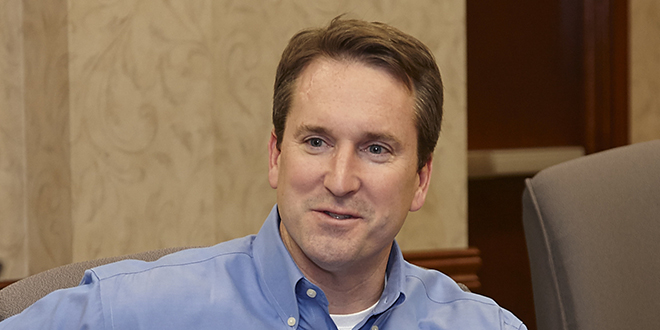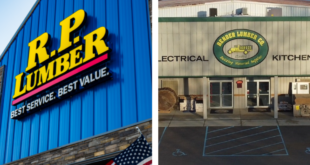On Jan. 4, Dan Starr became the fifth president and CEO of Do it Best Corp., succeeding Bob Taylor, who retired after holding that position for 14 years. Starr sat down with the editors of Hardware Retailing to talk about his experience with Do it Best Corp., the transition into his new role and his thoughts on the future of the co-op and of the hardware retailing industry.
Hardware Retailing (HR): Tell us about your career at Do it Best Corp. What did you take from your past experiences with the company that will inform your role as CEO?
Dan Starr (DS): Before I started working at Do it Best Corp., I was a partner with a large Midwest law firm. HWI [Hardware Wholesalers, Inc., which became Do it Best Corp. in 1998] was one of our long-standing clients. Over a ten-year period, I got to know a lot of folks at every level of the company.
In January 2005, I began my career at Do it Best Corp. as the vice president of human resources and general counsel. In that capacity, I worked across all divisions and got exposure to every facet of the organization.
I served in these roles until 2012, when I moved into the position of executive vice president and COO. That role allowed me to become directly embedded with all business operations, and I became intimately involved with the company’s strategic planning as well. This all served as excellent background before becoming president and CEO in January.
HR: Why did you decide to step into this new role after many years of experience in the legal field?
DS: It’s important to note that my choice to leave corporate law was not predicated on one day becoming the company’s leader. I was drawn to Do it Best Corp.—and changed the focus of my career—because I was so impressed with the company’s culture. It was extremely appealing. Do it Best Corp. embraces a culture of service that’s first and foremost focused on supporting the independent retailer. Serving our member-owners to help them grow and achieve their dreams has been a goal I could support from the very beginning.
It was a tremendous benefit for Bob that he grew up in a retail environment. It gave him the ability to immediately identify with the folks he aspired to serve. While I don’t have that background, I do have a different set of experiences and skills. We have a diverse group of members with many different types of businesses, and it’s been beneficial for me to travel and learn from their perspective and hear from them what they need from us to be successful.
HR: Can you tell us a little about the process as you’ve transitioned to CEO? What preparation and other work was involved as you prepared to step into this new role?
DS: The leadership transition process has been in process for a little over four years, and the steps involved were very methodical and planned out.
Bob and I first began discussing the transition at the end of 2011, and I stepped into the role of executive vice president and COO in June 2012. During that time, I learned more about what would be expected of me, and we created a plan for increasing my visibility within our leadership team and to the many initiatives in progress.
I’ve also had the opportunity to work with [former president and CEO] Mike McClelland and Bob Taylor these past 11 years. And I’ve had numerous opportunities to meet and work with [former president and CEO] Don Wolf. That’s three of our four CEOs in our now 71-year history who I’ve worked with. In that process, I’ve been fortunate to be exposed to what I consider the best in terms of leadership.
I had been out on the road some before moving into that role, but travel picked up as I prepared for the transition. I visited our retailers, vendors and distribution centers. I spent the better part of a week working in one member’s store. It’s one thing to visit a member location, but it’s quite another to work alongside the staff, receiving product and stocking shelves. Operationally, working in that store is probably one of the best things I could have done. I also spent some time on one of our trucks, making a delivery route. I thought that was enormously beneficial. You see things firsthand that you may not have given much thought to before. You see what retailers do to operate their business, and sometimes there are challenges we hadn’t anticipated. But in my travels, I learned more about day-to-day operations across many areas of the company.
HR: What are your plans as you step into this new role? Is there anything in particular you plan to address immediately?
DS: At Do it Best Corp., we are in a very fortunate position. We have a strong business plan that we are executing well. There is no urgency or emergency situation that requires a remedy—we aren’t in crisis mode. Therefore, I think the most important thing is that we have been able to make this transition smoothly. There hasn’t been, and won’t be, any disruption at our headquarters, our eight distribution centers or our member-owners.
HR: What would you identify as Do it Best’s biggest current strengths and its biggest areas for improvement?
DS: Our company is in a very enviable position: We have a solid, strong business position, and it’s a servant-led organization that is laser-focused on helping our independent retailers grow. That platform is probably the greatest strength we have.
As far as opportunities, from a broad perspective, I’d say we have a fairly mature industry. In some ways, you can see a period of contraction or consolidation. Some opportunities are at the core of what we do—we need to be able to grow, both in membership and in sales. While we have no need to change direction, it is a highly competitive environment, and we need to be able to continue to execute the strong plan we have.
HR: Business succession is a huge issue facing the independent home improvement retailing industry. How can Do it Best help its members address this?
DS: Succession planning is challenging by its nature. It’s all too easy to set it aside to focus on what’s happening day to day. Plus, it’s retailers’ own life and livelihood and control of their business, and it’s not easy to sever those ties when they retire. And in some cases, there’s the additional challenge of working with a family business.
In terms of education, training the next generation and the mechanisms to make succession planning work in the right way, these are all areas where we at Do it Best Corp. are working to ease the stress of that challenge. We have numerous educational tools available, and each fall, we offer our Leadership Development Institute, which is a full week of intense education for those stepping into leadership roles in members’ stores. I was very closely involved in the development of the pilot program we began with our own leadership team at Do it Best Corp., which has been going on for about 10 years now. We’ve taken what we learned from that program and built out a similar Leadership Development Institute for the next generation of member-owner.
Succession is not just an issue of identifying who you can find to unlock the door each day. We want to do everything we can to help assist our retailers during the transition. Of all the imperfect solutions, one that bothers me the most is when you delay or defer decision-making and allow the business to retire with you slowly over a period of time. That’s the most tragic because you can look back later and say, “It didn’t have to be that way.” This is a business that demands someone who is passionate and committed to the hardware and lumber industry. If you have it, it’s the greatest thing in the world, but you can’t manufacture that at the eleventh hour.
HR: How do you see the independent home improvement industry evolving?
DS: I think it’s really dominating a category, and building expertise within that category. There are niche categories within our industry that retailers want to be known for, and I see that continuing to evolve.
We’re also seeing different ways product is being delivered to the customer. Showrooming and online sales can cause challenges, so a way for us to address this is bringing our warehouses into our members’ stores. We can let customers know they can have something this week or next day, even if it’s not in the store. Customers have become more demanding, but in different ways. How do you service them in ways that are going to meet their objectives? You’re going to have to cater specifically to each of them.
There’s also the prevalence and use of big data. If you have a loyalty program, you have in your hands the data of everyone who’s in that program, and you can use that to personalize the marketing to each of those customers. If you have the data for everyone who bought a Weber grill from you last year, what would you do with that information for Memorial Day? I think we are far along on that path; the question now is, how do retailers leverage that data so they are making the best use of it?
HR: Is there anything you’d like to share with Do it Best retailers as you begin your new role as president and CEO?
DS: This company and its continuing legacy are important to me. There were people before us who gave their entire careers to HWI and Do it Best Corp. because it was so important to them, and I want to continue to honor their hard work and unwavering commitment. I want to make sure we continue to build on their legacy during my watch. And I believe strongly that servant leadership is the kindest and best way to run a business.
Our team often talks about their strong bonds with their co-workers and with our Do it Best members. We do life together, often across multiple generations. These are the kinds of things that keep me excited about coming to work every morning.
 Hardware Retailing The Industry's Source for Insights and Information
Hardware Retailing The Industry's Source for Insights and Information






